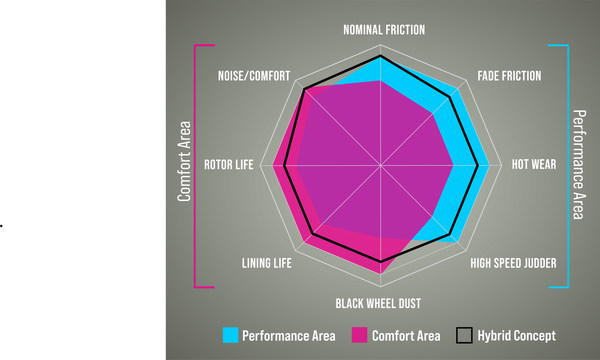 |
Innovative composite material offers braking performance and comfort in one concept to meet changing powertrain requirements
LAKE FOREST, Ill., April 21, 2022 /PRNewswire/ -- Leveraging its comprehensive material science expertise, Tenneco (NYSE: TEN) is introducing advanced OE hybrid friction material composites that simultaneously serve braking performance and comfort requirements in both internal combustion engine (ICE) and electric vehicles (EVs). The innovative new hybrid friction material combines the advantages of low steel (LS) and non-asbestos-organic (NAO) composites in one concept for brake pads.
LS materials offer high temperature braking performance and have the unique ability to remove disc corrosion. NAO materials enable good NVH performance and low brake dust contamination. Tenneco's unique hybrid composite material is expected to cover a range of different market demands with a single approach and is particularly suited to the growing range of electric and electrified vehicles.
"I am proud that Tenneco continues its track record of bringing innovative friction materials early to market," said Neville Rudd, Group Vice President and General Manager, Tenneco Braking. In 2014, our team was one of the first to introduce copper-free braking materials for light vehicles, well ahead of industry regulation. "We see strong potential in our new hybrid friction material composites that enable us to offer outstanding braking solutions for various customer demands, including in the growing e-mobility segment. This expands and diversifies our product portfolio and strengthens our ability to deliver solutions for all our customers, regardless of powertrain strategy."
Hybrid friction materials: Portfolio diversification in a demanding and changing market environment
While the braking system in traditional powertrains works to provide appropriate deceleration and short stopping distances, battery-electric vehicles, hybrid and plug-in-hybrid vehicles are mainly decelerated by recuperation, largely using the electric motor. When brakes are applied, silent braking performance is key to driver and passenger comfort as there is no engine noise. Reduced use of the brakes can also result in rotor corrosion and rust on the brake discs, which needs to be removed quickly to ensure proper braking performance. Additionally, there has to be sufficient friction power available for emergency braking purposes to ensure short stopping distances to comply with safety requirements.
Holger Schaus, Vice President Global Engineering, Tenneco Braking, added: "We are working closely with OEMs and Tier 1 braking suppliers to match specific requirements and help ensure best-possible performance and comfort with our newly developed advanced hybrid friction materials. While low steel and non-asbestos-organic composites feature different tribology regarding adhesion and abrasion, our comprehensive experience in dedicated material formulations and deep understanding of related science enable us to overcome challenges in this new field and develop advanced solutions that cover a broad range of technical requirements."
The new hybrid friction material is in series production at Tenneco´s OE Braking facility in Chongqing, China. Several projects are in the testing and evaluation phase in Europe.
About Tenneco
Tenneco (NYSE: TEN) is one of the world's leading designers, manufacturers and marketers of automotive products for original equipment and aftermarket customers, with full year 2021 revenues of $18 billion and approximately 71,000 team members working at more than 260 sites worldwide. Through our four business groups, Motorparts, Performance Solutions, Clean Air and Powertrain, Tenneco is driving advancements in global mobility by delivering technology solutions for diversified global markets, including light vehicle, commercial truck, off-highway, industrial, motorsport and the aftermarket.
Visit www.tenneco.com to learn more.
Safe Harbor
This release contains forward-looking statements. These forward-looking statements include, among others, statements relating to our plans to offer products and advance projects to meet changing powertrain requirements. Forward-looking statements are subject to a number of risks and uncertainties that could cause actual results to materially differ from those described in the forward-looking statements, including the possibility that Tenneco may not progress or execute on projects to meet changing powertrain requirements; the possibility that Tenneco may not achieve efficiencies in internal combustion engines or electric vehicles; as well as the risk factors and cautionary statements included in Tenneco's periodic and current reports (Forms 10-K, 10-Q and 8-K) filed from time to time with the SEC. Given these risks and uncertainties, investors should not place undue reliance on forward-looking statements as a prediction of actual results. Unless otherwise indicated, the forward-looking statements in this release are made as of the date of this communication, and, except as required by law, Tenneco does not undertake any obligation, and disclaims any obligation, to publicly disclose revisions or updates to any forward-looking statements. Additional information regarding these risk factors and uncertainties is detailed from time to time in the company's SEC filings, including but not limited to its annual report on Form 10-K for the year ended December 31, 2021.
In addition, please see Tenneco's press release issued on February 23, 2022 for factors that could cause Tenneco's future performance to vary from the expectations expressed or implied by the forward-looking statements herein and for certain reconciliations of GAAP to non-GAAP results.
Media contacts
Margie Pazikas |
Stefan Zech |

